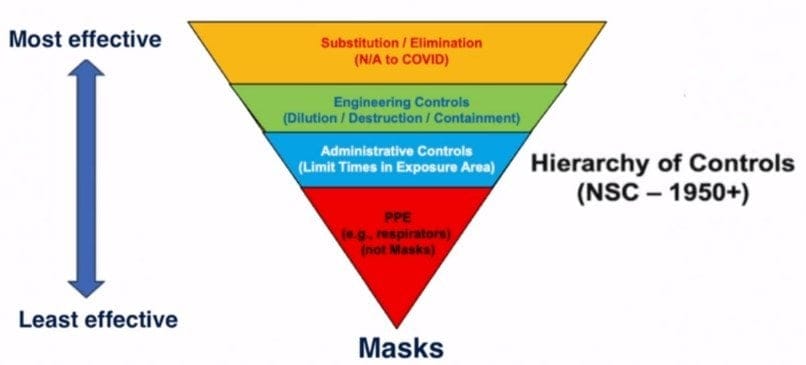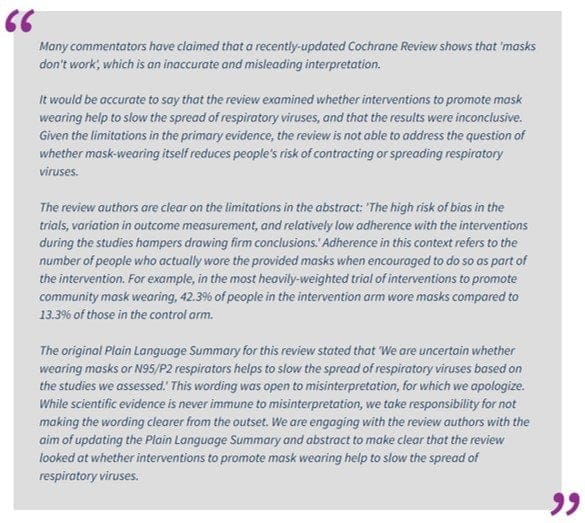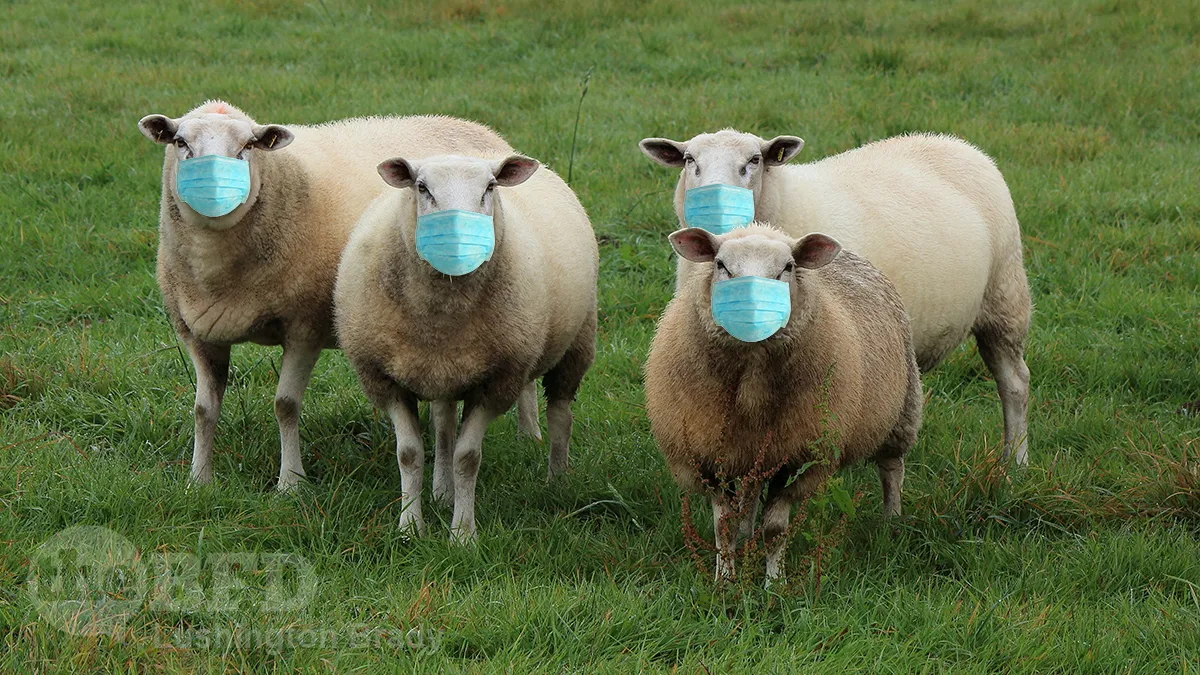Table of Contents
New Zealand Doctors Speaking Out with Science
Less than a month since we reported on the Cochrane Library’s Physical interventions to interrupt or reduce the spread of respiratory viruses, the conflicts of interest which we wrote about have taken centre stage again.
Public health is a diverse discipline encompassing a wide spectrum of sub-specialties such as clinical medicine, environmental health, program administration, chronic disease, statistical analysis, microbiology, health promotion, psychology, infectious disease, pharmacology and more. Use of personal protective equipment (PPE) is a sub-specialty of industrial hygiene. This is described well in a 2022 presentation (thanks to Coronavirus Plushie), by research engineer and certified industrial hygienist Stephen Petty.
!function(r,u,m,b,l,e){r._Rumble=b,r[b]||(r[b]=function(){(r[b]._=r[b]._||[]).push(arguments);if(r[b]._.length==1){l=u.createElement(m),e=u.getElementsByTagName(m)[0],l.async=1,l.src="https://rumble.com/embedJS/udh4zl"+(arguments[1].video?'.'+arguments[1].video:'')+"/?url="+encodeURIComponent(location.href)+"&args="+encodeURIComponent(JSON.stringify([].slice.apply(arguments))),e.parentNode.insertBefore(l,e)}})}(window, document, "script", "Rumble");Rumble("play", {"video":"v1ckalw","div":"rumble_v1ckalw"});
Otago University epidemiologist Michael Baker has been promoted erroneously by New Zealand media since 2020 as an expert on infection control measures, especially face masks. Mimicking America’s immunologist Tony Fauci (who is now under seriously dark clouds), Baker has given inconsistent and disorienting guidance throughout the pandemic, without offering any supporting evidence for changing recommendations. He and his global counterparts across the western world ultimately settled on a theory that face masks are protective against aerosol transmission. Petty describes this assertion as “bogus“.
After being exhaled into the environment, airborne viruses can become suspended in tiny dehydrated particles of dust called aerosols. Magnitudes tinier than the apertures in a face mask, infected aerosols can float on air currents for hours to days. Their size and persistence make face masks useless against aerosol transmission.

As described by Petty, the most effective interventions at stopping the spread of aerosols are engineering controls to dilute, destroy or contain a harmful organism. Examples include adequate ventilation to dilute the concentration of aerosols, and HEPA filters such as those used in commercial aircraft and medical laboratories to circulate air and trap infected particles. The least effective controls are personal protective equipment used by individuals. Petty explains why face masks (as opposed to sealed respirators) are not considered to be effective PPE, and therefore sit outside the hierarchy of controls.

Cochrane Library’s January 2023 review is the most recent meta-analysis of evidence relating to face mask effectiveness. The lead author is Dr Tom Jefferson, a clinical epidemiologist at Oxford University who has been researching transmission of respiratory viruses for over thirty years.
Interestingly, in a recent interview Dr Jefferson described the evidence for aerosol transmission as “thin as air“, arguing that there are likely mixed modes of transmission, rendering most interventions as having little to no benefit. Anyone with experience in respiratory disease control would likely agree as it is rarely (if ever) possible to determine where an outbreak begins, and where or how it spreads before petering out again. That is until covid, when suddenly almost all ‘cases’ seemed to be confidently informed by dubiously trained and likely inexperienced ‘contact tracers’ exactly where and how they became infected.
Other systematic reviews include More than 170 Comparative Studies and Articles on Mask Ineffectiveness and Harms by infectious disease epidemiologist Dr Paul Alexander at the Brownstone Institute; and the work of data analyst and author of Unmasked: The Global Failure of Covid Mask Mandates, Ian Miller. Population-level outcomes are consistent with the physical science: face masks offer little to no protection against transmission of airborne viruses.
Bottom line: if you can inhale and exhale through a mask (which is kind of essential for life), there will be microbes in the breathed air.
Conflicts of Interest Infiltrate the Cochrane Library
Investigative medical reporter Maryanne Demasi wrote about????? controversy at the Cochrane Collaboration five years ago after their co-founder, Danish physician and medical researcher Professor Peter Gotzsche, was dismissed from the board, after a series of unflattering vaccine reviews. He made accusations of censorship and pharmaceutical industry infiltration, openly stating “the ten largest pharmaceutical companies have a business model that meets the criteria for organised crime“. His 2018 presentation at the Max Planck Institute, Survival of a Whistleblower, eloquently weaves the links between human nature, history, medicine, pharmaceutical harms, research bias, media influence, corruption and criminality. It seems a harbinger of what lay ahead for humanity only eighteen or so months later.
Zeynep Tufekci is a New York Times columnist and associate professor of sociology at the University of North Carolina. The New York Times recently tweeted that Tufekci “sounded an early alarm on the need for protective masks. But long before she became perhaps the only good amateur epidemiologist, she had quietly made a habit of being right on the big things …” An op-ed written by Tufekci in March 2020 is described by a CDC insider as “the tipping point” leading to an April 2020 recommendation reversal when all Americans over the age of two were suddenly advised to “wear masks to slow the spread of the coronavirus“.
As a sociologist Tufekci has no expertise in virus control measures. However, her personal ideology combined with high profile and audience reach seems to exemplify the phenomenon of ‘expert bias’. Described by David Sackett, the founder of evidence based medicine in his BMJ opinion piece The sins of expertness and a proposal for redemption, ‘expert bias’ thwarts new ideas, retards science and slows progress towards truth.
The Cochrane Library’s systematic review on non-pharmaceutical interventions concluded that “wearing masks in the community probably makes little or no difference to the outcome of influenza?like illness (ILI)/COVID?19 like illness compared to not wearing masks…” On 10 March 2023 Tufekci wrote a direct rebuttal: Here’s Why the Science Is Clear That Masks Work, including what Dr Jefferson has called an attack on his scientific reputation. The rebuttal is summarised by Maryanne Demasi as “despite no high-quality data, we could conclude, based on poor evidence, that masks do work.“
Tufekci appears to have pressured the Editor-in-Chief of the Cochrane Library into publishing an official statement somewhat implying a denial of the study findings.

The review’s authors were not consulted before the statement was published. Dr Jefferson and his Oxford University colleague Carl Henegan, professor of evidence based medicine, have written on the issue at their shared substack, Trust the Evidence: Open season on scientists. They repeat concerns that mainstream media opinion pieces are replacing scientific journal editorials, relying on loud and strident arguments based on “the poorest quality evidence available“, as well as ad hominem attacks on scientists.
So, it would seem that based on the pressure from a sociologist who writes for the New York Times, the Editor of the “independent” Cochrane Library, once a bastion of scientific publications, has issued a statement suggesting that the finding of one of their own papers may be misinterpreted.
We now find ourselves in the situation where newspaper authors can not only override the findings of academic publications, but also coerce the editor of an academic journal into changes to suit their own narrative.
Contrary to the fallacious political argument that New Zealanders need only rely on a “single source of truth“, quality public health is the result of collaborations between different fields of expertise, open scientific debate and acknowledgement of the various forms of bias which can distort results. The past three years have seen all collaborative attempts crushed whilst individuals with influential connections, but limited and/or irrelevant expertise are promoted as all-knowing. This has resulted, and continues to result, in enormous harms to public health, democracy and the scientific process, across our nation and the globe.
Unless people everywhere begin to reject the authority of one-dimensional influencers posing as experts, the future of science, medicine and indeed the world appears grim.









